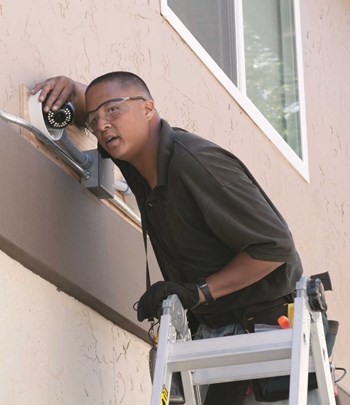
For most people, nothing is more important than knowing that they and their families are safe and secure in the place they call home. Boards, management and security firms all must work together seamlessly and cohesively to create that safe environment without making a building or community feel like a citadel. It can be a delicate balancing act, but with the right approach, it can be done.
Beginning the Process
In most cases, the board and managers will shoulder the burden of finding the right security firm with which to work. “Each building or community is different and has its own priorities, but oftentimes it’s the management company hired to manage the property that makes security decisions,” says Mark Lerner, Ph.D, a criminologist and president of EPIC Security Corp., in Manhattan. “Sometimes a developer will make a bid or they’ll group together to form an association for common services that will include security services.”
“It all depends on who has the power at the building,” adds Wilfredo Ortiz, president of Advance Security & Intercoms in Yonkers. “Sometimes the managing agent makes security decisions and all they would need is board approval. If the board is involved in these types of decisions then most likely the managing agent will find a company and recommend the company. Then we’ll sit down with the board and figure out what it is exactly they are looking for and work within their budget.”
Finding the right security partner can take time but it starts with research and talking with other board members, managers and staff. “If you have a high-rise development with four or five high-rise buildings and a parking lot, then look for a company that does that,” says Lerner. “And if you live in a gated community look for a company that does that. Or you can contact that association or condo and ask them how long have you used that company and what their experience has been. You should see what the guards look like, what their vehicles look like and how responsive their management is.
“You call the office at 12 noon, you’ll get a salesman and they sound very nice, but call the company you are thinking about hiring in the middle of the night or on a holiday and see how fast they answer the phone. You don’t want to get an answering machine in India. That’s how you should test out your security company before hiring them.”
In addition to word-of-mouth and personal recommendations, researching through media and online information may also offer assistance in choosing a security firm. Also, don’t forget to make sure that the security company’s licensing and insurance requirements are up to date.
“In New York every guard must be trained and registered with the state,” adds Lerner. “That means they’ve been fingerprinted and their criminal record has been checked and they’ve had the necessary training. It’s also good to check with NYARM, the New York Association of Realty Managers. If you see guards that look good, are well dressed and polite. Make a note of that company, that’s a company you should take a look at.”
Determining the Needs
Every building and community is different, meaning they all have disparate and unique security needs. The best way to determine an effective plan for safety is to do a thorough assessment of those needs.
“We do an on-site visit and do a security analysis then we’ll make recommendations,” says Lerner. “If it’s a high-rise, I may recommend a guard in the lobby and another guard walking around the perimeter. If it’s a homeowner association that has lots of streets, I might recommend a radio, motor patrol vehicle. You’re looking for visibility with security.”
Guy Gabai, vice president of operations for SOS Locksmith Corp & SOS Advanced Security in Manhattan, agrees that a detailed assessment of each property in imperative and that detailed conversations with board members and management also will be necessary.
“It’s always key that people who live in the building or manage the building meet us,” says Gabai. “There are other factors to consider—like how many tenants are in the building? How much traffic do you get? Does the super live in or out of the building? These questions help us to design a security system for the building,” he says.
“The main concern is typically the perimeter and the doors of the building to make sure that everything is safe and efficient and up to code. We also take a look at areas people want cameras so they can see people coming in and out, or more importantly have cameras on the properties for insurance purposes. Say you fell in front of someone’s building because they didn’t remove the ice. You could rely on your security camera to capture that footage and find out exactly what happened. But more importantly it would capture a break-in,” Gabai says.
The availability of budget dollars also will factor into the planning process. “The most important thing is to come up with a budget,” says Ortiz. “Once a board establishes a budget most security companies will work with you so you can stay within that budget. You need to first figure out what you can spend and work around that.”
Building the Best Plan
As with anything, the key to successfully building a strong security plan is information and communication. The more information available to the security firm—not just from boards and management but from residents, shop owners and business owners—the better able a security firm will be able to establish a history and pattern for that area and build a plan that is unique to those needs.
Clients and firms need to work as well to make sure they are focused on the real needs. For example, a building might not need a new surveillance camera; they might simply need to ensure that someone is watching the videos each day. Many consultants detail situations in which crimes had taken place or were suspected but no one had watched the surveillance footage.
“We find that we are in communication with a lot with co-ops. There’s a big relationship with co-ops because we get to know the people a lot better,” says Gabai. “Typically, we are meeting people from the board who make the decisions. Many times our company goes to co-op meetings to present the type of materials we want to install. We answer questions so it’s more of a personable type of relationship than say dealing with a huge hospital where you deal with one person that makes the decisions. In a co-op, you’ll have 10 different people with 10 different opinions. Everyone has different needs so you have to come up with solutions that everyone has to adhere to and agree with.”
For buildings or associations that are on tight budgets, security firms may also be able to come up with lower cost solutions. That ability to think creatively can go a long way. Security experts recommend setting up a Facebook page for a neighborhood watch or join Every Block, an online program that allows residents to share messages on incidents that have occurred or, simply, just ask questions about their neighborhood.
“Any company is most likely, when they start competing on pricing, they are going to take it out on the equipment, they are going to start looking for the cheapest things,” warns Ortiz. “I recommend that they figure out what type of cameras they are looking for—is it going to be digital or analog? Digital is the new system out right now, it’s IP-based and you are going to get HD quality. With it, you’ll get facial recognition versus analog where you don’t get facial recognition—you get a blurry picture. IP is fairly new but it is coming down in price because more people are making it. It’s definitely worth the investment. A lot of these companies will give you a price then you’ll say ‘we can’t afford that,’ they won’t come down in their price, what they’ll do is give you less expensive equipment that will more than likely fail over time and won’t last. It’s definitely worth the investment to go with the more expensive camera equipment.”
“Everybody wants more security than they actually need, but you have to do the arithmetic,” adds Lerner. “I’ve got a lot of calls lately because of Hurricane Sandy. People will say, ‘I want a security guard in front of my house in the Rockaways to watch for looting.’ That’s cost prohibitive. It’s the same thing for co-ops and condos, you have to figure out what’s cost prohibitive. You have to be realistic. Most people bid it out and go for the lowest price. Don’t do that. Like everything else in life, you get what you pay for. If you go for the absolute lowest price you can assure yourself that you are getting guards that are being paid minimum wage. At the same time, it’s also easy to overpay. Sometimes people will pay 10 percent more than they have to if they are not careful.”
Dollars and Sense
Whether things are going well or there is room for improvement in the security arena, it is important to evaluate the relationship regularly.
Security experts agree that boards and the managing agent should reassess their service contracts on an annual basis or meet with security vendors to discuss concerns and develop an action plan.
It’s no easy job keeping individuals and families feeling safe and secure, but with the right preparation, evaluation and execution of plans, it can be done efficiently and well. And that will help everyone sleep a lot easier each night.
Liz Lent is a freelance writer and a frequent contributor to The Cooperator. Staff Writer Christy Smith-Sloman contributed to this article.






Comments
Leave a Comment